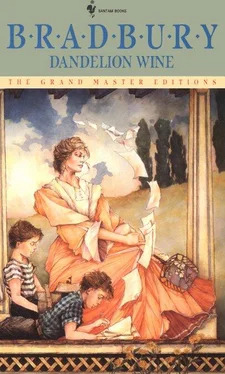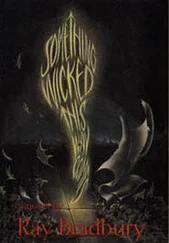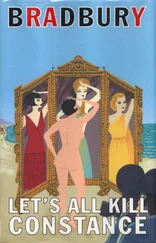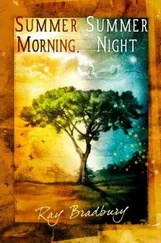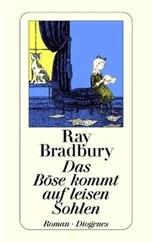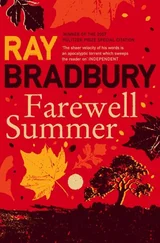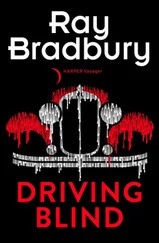And off they marched, Grandma bewildered, on Rose’s elbow, into the summer afternoon.
They returned with groceries, new glasses, and a hairdo for Grandma. Grandma looked as if she had been chased around town. She gasped as Rose helped her into the house.
“There you are, Grandma. Now you got everything where you can find it. Now you can see!”
“Come on, Doug,” said Grandfather. “Let’s take a walk around the block and work up an appetite. This is going to be a night in history. One of the best darned suppers ever served, or I’ll eat my vest.”
Suppertime.
Smiling people stopped smiling. Douglas chewed one bit of food for three minutes, and then, pretending to wipe his mouth, lumped it in his napkin. He saw Tom and Dad do the same. People swashed the food together, making roads and patterns, drawing pictures in the gravy, forming castles of the potatoes, secretly passing meat chunks to the dog.
Grandfather excused himself early. “I’m full,” he said.
All the boarders were pale and silent.
Grandma poked her own plate nervously.
“Isn’t it a fine meal?” Aunt Rose asked everyone. “Got it on the table half an hour early, too!”
But the others were thinking that Monday followed Sunday, and Tuesday followed Monday, and so on for an entire week of sad breakfasts, melancholy lunches, and funereal dinners. In a few minutes the dining room was empty. Upstairs the boarders brooded in their rooms.
Grandma moved slowly, stunned, into her kitchen.
“This,” said Grandfather, “has gone far enough!” He went to the foot of the stairs and called up into the dusty sunlight: “Come on down, everyone!”
The boarders murmured, all of them, locked in the dim, comfortable library. Grandfather quietly passed a derby hat. “For the kitty,” he said. Then he put his hand heavily on Douglas’s shoulder. “Douglas, we have a great mission for you, son. Now listen . . .” And he whispered his warm, friendly breath into the boy’s ear.
Douglas found Aunt Rose, alone, cutting flowers in the garden the next afternoon.
“Aunt Rose,” he said gravely, “why don’t we go for a walk right now? I’ll show you the butterfly ravine just down that way.”
They walked together all around town. Douglas talked swiftly, nervously, not looking at her, listening only to the courthouse clock strike the afternoon hours.
Strolling back under the warm summer elms toward the house, Aunt Rose suddenly gasped and put her hand to her throat.
There, on the bottom of the porch step, was her luggage, neatly packed. On top of one suitcase, fluttering in the summer breeze, was a pink railroad ticket.
The boarders, all ten of them, were seated on the porch stiffly. Grandfather, like a train conductor, a mayor, a good friend, came down the steps solemnly.
“Rose,” he said to her, taking her hand and shaking it up and down, “I have something to say to you.”
“What is it?” said Aunt Rose.
“Aunt Rose,” he said. “Good-bye.”
They heard the train chant away into the late afternoon hours. The porch was empty, the luggage gone, Aunt Rose’s room unoccupied. Grandfather in the library, groped behind E. A. Poe for a small medicine bottle, smiling.
Grandma came home from a solitary shopping expedition to town.
“Where’s Aunt Rose?”
“We said good-bye to her at the station,” said Grandfather. “We all wept. She hated to go, but she sent her best love to you and said she would return again in twelve years.” Grandfather took out his solid gold watch. “And now I suggest we all repair to the library for a glass of sherry while waiting for Grandma to fix one of her amazing banquets.”
Grandma walked off to the back of the house.
Everyone talked and laughed and listened—the boarders, Grandfather, and Douglas, and they heard the quiet sounds in the kitchen. When Grandma rang the bell they herded to the dining room, elbowing their way.
Everyone took a huge bite.
Grandma watched the faces of her boarders. Silently they stared at their plates, their hands in their laps, the food cooling, unchewed, in their cheeks.
“I’ve lost it!” Grandma said. “I’ve lost my touch . . .”
And she began to cry.
She got up and wandered out into her neatly ordered, labeled kitchen, her hands moving futilely before her.
The boarders went to bed hungry.
Douglas heard the courthouse clock chime ten-thirty, eleven, then midnight, heard the boarders stirring in their beds, like a tide moving under the moonlit roof of the vast house. He knew they were all awake, thinking, and sad. After a long time, he sat up in bed. He began to smile at the wall and the mirror. He saw himself grinning as he opened the door and crept downstairs. The parlor was dark and smelled old and alone. He held his breath.
He fumbled into the kitchen and stood waiting a moment.
Then he began to move.
He took the baking powder out of its fine new tin and put it in an old flour sack the way it had always been. He dusted the white flour into an old cookie crock. He removed the sugar from the metal bin marked sugar and sifted it into a familiar series of smaller bins marked spices, cutlery, string. He put the cloves where they had lain for years, littering the bottom of half a dozen drawers. He brought the dishes and knives and forks and spoons back out on top of the tables.
He found Grandma’s new eyeglasses on the parlor mantel and hid them in the cellar. He kindled a great fire in the old wood-burning stove, using pages from the new cookbook. By one o’clock in the still morning a huge husking roar shot up in the black stovepipe, such a wild roar that the house, if it had ever slept at all, awoke. He heard the rustle of Grandma’s slippers down the hall stairs. She stood in the kitchen, blinking at the chaos. Douglas was hidden behind the pantry door.
At one-thirty in the deep dark morning, the cooking odors blew up through the windy corridors of the house. Down the stairs, one by one, came women in curlers, men in bathrobes, to tiptoe and peer into the kitchen—lit only by fitful gusts of red fire from the hissing stove. And there in the black kitchen at two of a warm summer morning, Grandma floated like an apparition, amidst bangings and clatterings, half blind once more, her fingers groping instinctively in the dimness, shaking out spice clouds over bubbling pots and simmering kettles, her face in the firelight red, magical, and enchanted as she seized and stirred and poured the sublime foods.
Quiet, quiet, the boarders laid the best linens and gleaming silver and lit candles rather than switch on electric lights and snap the spell.
Grandfather, arriving home from a late evening’s work at the printing office, was startled to hear grace being said in the candlelit dining room.
As for the food? The meats were deviled, the sauces curried, the greens mounded with sweet butter, the biscuits splashed with jeweled honey; everything toothsome, luscious, and so miraculously refreshing that a gentle lowing broke out as from a pasturage of beasts gone wild in clover. One and all cried out their gratitude for their loose-fitting night clothes.
At three-thirty on Sunday morning, with the house warm with eaten food and friendly spirits, Grandfather pushed back his chair and gestured magnificently. From the library he fetched a copy of Shakespeare. He laid it on a platter, which he presented to his wife.
“Grandma,” he said, “I ask only that tomorrow night for supper you cook us this very fine volume. I am certain we all agree that by the time it reaches the table tomorrow at twilight it will be delicate, succulent, brown and tender as the breast of the autumn pheasant.”
Grandma held the book in her hands and cried happily.
Читать дальше
